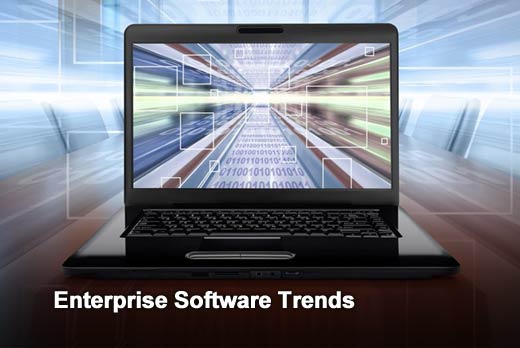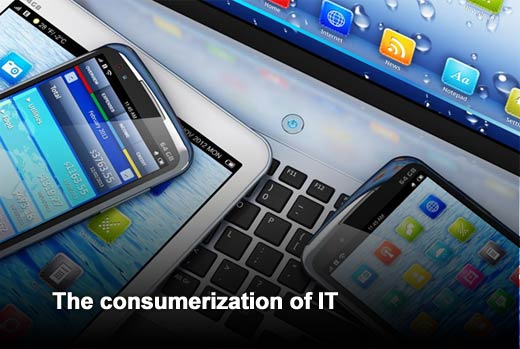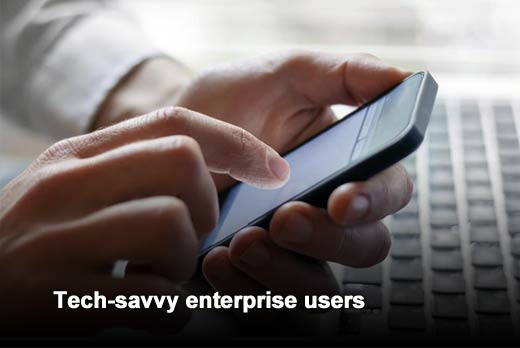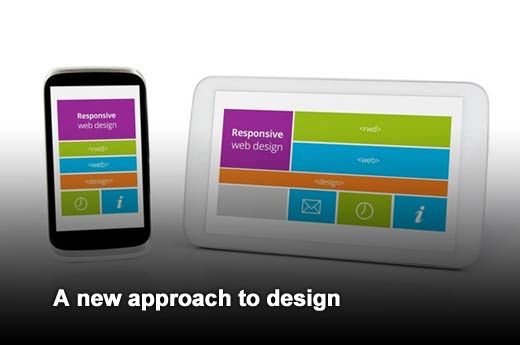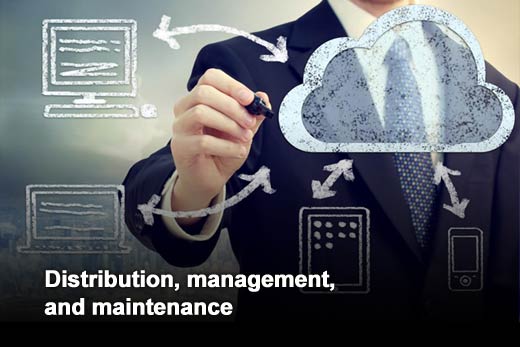The tools that business people use to accomplish tasks, land sales and run departments are currently undergoing a tremendous period of innovation. At Icreon Tech, enterprise clients know full well the importance of providing their employees with a powerful and productive software application.
Throughout their work with international logistics companies, retail brands and non-profit organizations, they’ve seen the transformative ability of effective enterprise software firsthand. The advent of mobile apps, innovative approaches to design for touch-screen devices, and the use of cloud computing have fundamentally altered the landscape of enterprise software.
In this slideshow, you’ll find a list of the top trends in enterprise technology as well as an explanation for how such trends contribute to a well-oiled operation.
Click through for top trends in enterprise technology as well as an explanation for how such trends contribute to a well-oiled operation, as identified by Icreon Tech.
The consumerization of IT
Industry analysts have thrown around the term ‘consumerization of IT’ as a means to define a specific trend in technological progression. Traditionally, technological progress and innovation emerged in the enterprise space to eventual adoption in the consumer arena. In recent years, this model has been turned on its head.
Now that mobile devices have dominated the computing landscape, the average consumer is interacting with high-quality hardware and software that they want replicated in the workplace. Mobile apps, bring your own device (BYOD) policies for employees, and even custom enterprise app stores have sprung up in the enterprise as a direct result of trends in the consumer space.
With an employee base that is more tech-savvy than any previous workforce, enterprises are forced to emulate the ease-of-use and intuitive design of consumer apps. Enterprises that fail to meet expectations will face the obstacles associated with poor user adoption and the subsequent wasted investment.
Tech-savvy enterprise users
It may be hard to believe, but according to Nielsen, the average American spends over 60 hours every week with a digital device. Whether it be at work, during a commute, or communicating with distant relatives, software has become ingrained into every facet of our daily lives.
As a result of the constant interaction with high-end expertly crafted software, people have upped the ante when it comes to expectations for business applications and enterprise technology.
Companies such as Infor, Workday, Box and Salesforce have succeeded as enterprise technology firms thanks in part to their focus on consumer friendly and intuitive application design. One of Infor’s primary corporate mantras is “NO FUGLY SOFTWARE.”
We’ve reached the point where strategic design that considers the end user is central to the overall success of technology in the workplace.
A new approach to design
Designers and developers alike have been forced to adapt their skills for a Post-PC era. In recent years, PC shipments have reduced dramatically thanks to the popularity of smartphones, tablets and mobile apps. With an increased demand for software that works well on a mobile device, designers have revamped their approach to creating intuitive user interfaces (UIs) and content.
Touch-screen technology has effectively replaced the mouse for mobile devices, which means traditional page elements and functional features must react to a fingertip rather than a mouse click. This factor forces mobile designers to abandon some of their instincts related to desktops in favor of mobile-optimized techniques.
Varying screen sizes, multiple operating systems (OSes), and the quality performance of mobile apps have resulted in new approaches from mobile designers. And those new approaches are being carried over into the increasingly mobile workforce.
Distribution, management, and maintenance
Even the way companies and their IT teams distribute software has changed. The Apple App Store and Google Play Store have fundamentally changed the model for how companies can host and distribute software to customers. This trend has finally made a crossover to the enterprise space. Large corporations like CDW and IBM have adopted the model to deliver products to internal employees and customers via an app store.
Within the enterprise, IT teams are creating custom enterprise app stores to make fleets of mobile apps available to employees. Upon logging in, each employee receives a tailored selection of apps related to their specific department and job functions. Not only do enterprise app stores allow for a centralized software hub, they also contribute to a secure mobile workforce.
IT teams can whitelist and blacklist popular consumer apps (as long as they’re productive) in order to prevent malicious apps from accessing confidential data or spreading malware.


